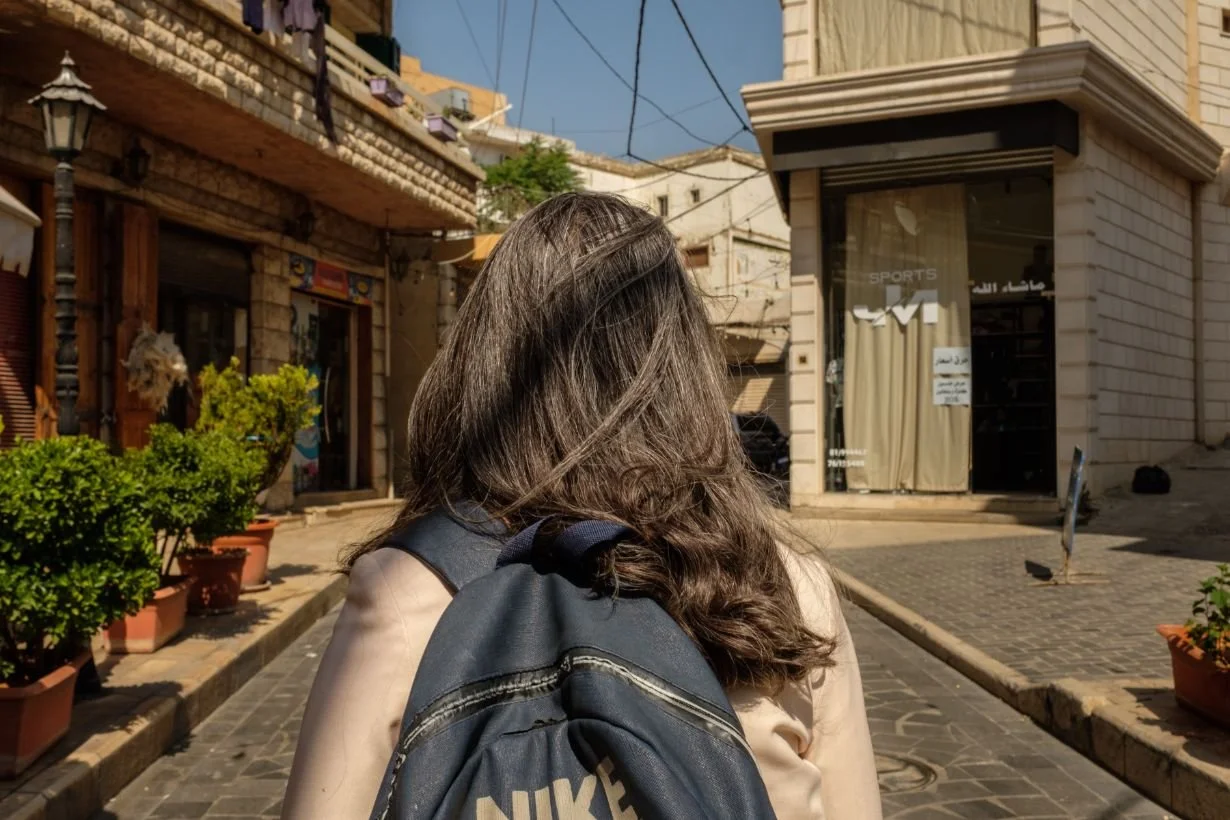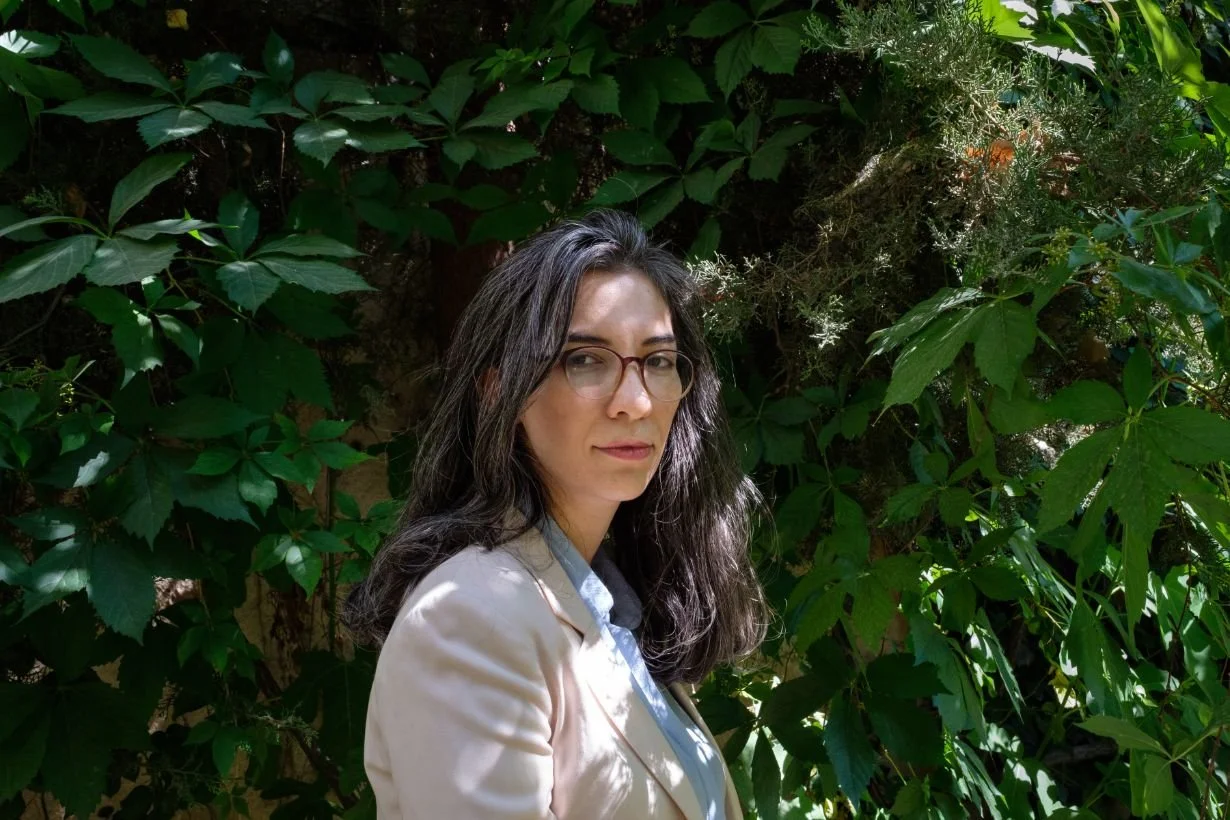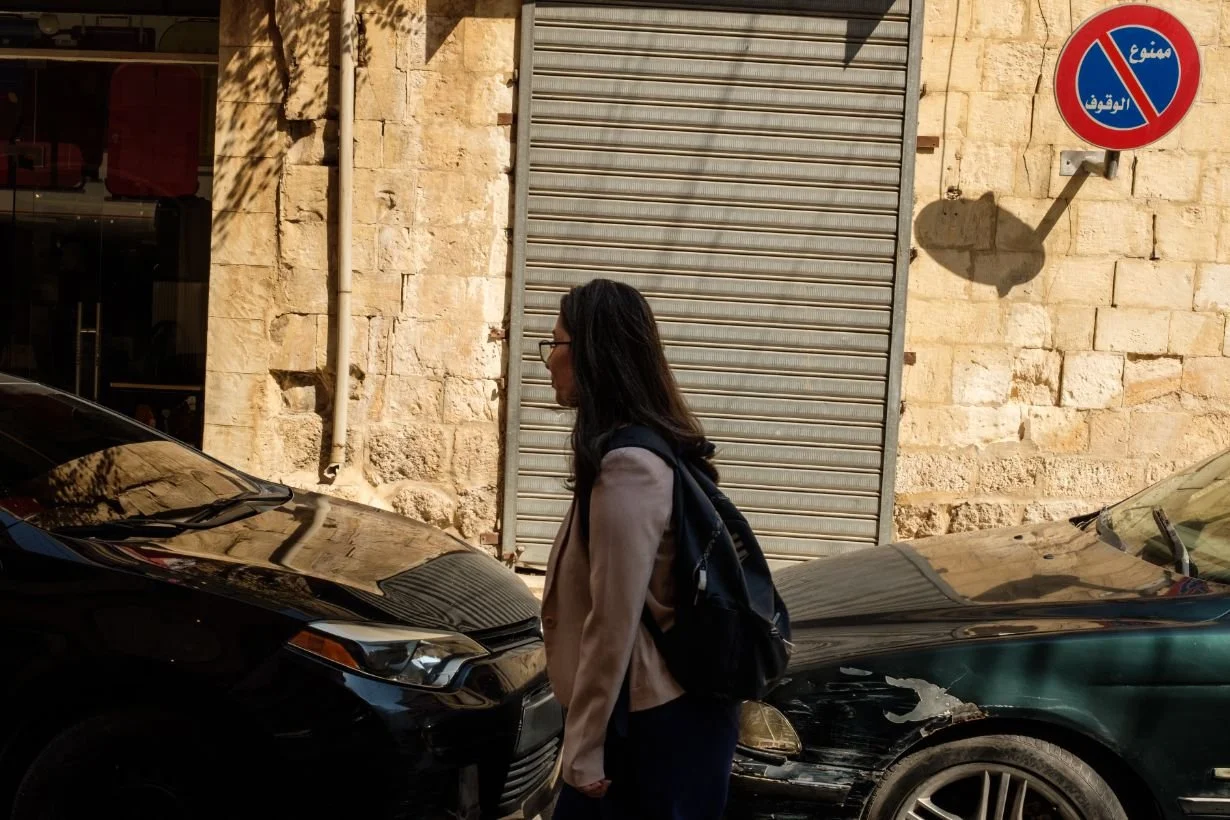Zainab . زينب
On May 18th, 2025 the municipal elections were held in Baalbek, Lebanon. Among the runners was an independent list, Baalbek Madinati. A group that was a challenge to the traditional runners who generally held a monopoly over the region. This new opposition was threatening enough that some felt the need to tear down Baalbek Madinati’s banners. One of the Baalbek Madinati candidates was Zainab Othman - Professor of law at technical institutes and investigative journalist.
Zainab does not shy away from stating her opinion. “People could be in a certain party or believe in an ideology, but they should admit that this party failed after having had the leadership for years. It is necessary to make room and give the opportunity to new blood to enter the decision-making and municipal work arena, as long as the previous approach has proven ineffective and sometimes even harmful to the public interest. This is why you have elections, for new people to hold them accountable.”
Baalbek Madinati eventually lost the election but it wasn’t because they didn’t work hard enough.“If you want to run for public office, whether you’re by yourself or with a list (lay7a), you need financial support.” says Zainab. “I ran without having this financial luxury. This makes you lack access to news, research, to have more meetings, events, and communication with people. Or to have marketing like podcasts. So the financial obstacle was a major one.”
Zainab Othman had been interested in politics and law since the age of 12. A teacher at her school had inspired the students to think of Lebanon outside sectarianism. Zainab became passionate about activism and wanted to translate change through politics and education.
“I realized that politics on their own don’t work. It needs tools. So I studied law.”
While studying at the Lebanese University, Zainab met her future husband Mahmoud, an Egyptian national, who was visiting the school and hoping to study arts. When that didn’t work out, they kept in touch online. Zainab visited Mahmoud in Egypt in 2015 and 2016, and they eventually got married in 2018. They expected that this multi national union would have to confront future hurdles but not to the extent that it has.
Due to the archaic and sexist nationality law left over from the French mandate, Othman’s children would not be granted Lebanese citizenship. Only fathers in Lebanon are able to pass on nationality to their children. Aside from having to deal with residencies under kafala (sponsorship) for their kids and the high cost it entails to renew passports, school registration, etc… this law played a role in their tragedies.
The Lebanese universal healthcare coverage is something that has been talked about in government but never achieved in action. While governmental hospitals provide care for Lebanese citizens and non-citizens, non-citizens often face high costs. This discourages non-citizens from seeking healthcare putting them in precarious health conditions. If they do seek it, generally it causes them significant financial burdens.
In August 2021, when Zainab and Mahmoud had been struggling financially due to losing their jobs during lockdown, they were also preparing to welcome a baby girl. Zainab went into labor early. At that time, all the government hospitals in Baalbek which had incubators were full. The couple had to go to Zahleh for her to give birth. The governmental hospital in Zahleh almost turned her away even though she was bleeding because they didn’t have a full team working - There was no gasoline for people to get to work, nor enough donated blood secured given her condition. With Zainab’s insistence, she was able to check into the hospital and give birth on August 21st. The baby girl was placed in an incubator for six days and sadly passed away on August 26th. The devastation doesn’t end there. Zainab and Mahmoud were told the hospital wouldn’t release the premie until the couple paid the cost of the incubator. A suffocating amount that is no different from the prices of private hospitals. A cost they didn’t even have a fraction of at the time. For five days, the grieving parents were making calls, trying to reach the Minister of Health who would be able to grant a payment exemption for the baby’s release. During this time, the traumatized couple struggled knowing their baby’s body was in a hospital alone, without burial. Only until August 31, at noon, was Zainab and Mahmoud allowed to take the baby and bury her after the minister gave the green light. A memory and an emotional burden they continue to carry to this day.
In Lebanon, every day one hears of a tragedy. Every day feels as though residents are fighting for something. There’s a struggle to get the basic needs - electricity, water, education. It often leaves majority of the community too exhausted to think about the causes of these daily battles. Zainab’s perspective of the country’s issues is more panoramic given how long she has been studying and advocating. If the struggle is private, she knows the public must be suffering similarly if not the same. She takes on the fight as though it’s her own because the political is often times personal.
During the elections, Zainab was accused of aiming too high because her list of changes and goals were many; Organizing traffic and roads, clean water, safe spaces for women and children, environmental reform, tourism initiatives, public health, etc… However, the key issue that pushed her most was citizenship rights. This has been on her mind since her first son was born and became more rooted after the death of her daughter. “My son speaks Baalbaki more than I do. He’s in tune with everything that is Baalbek from the environment to the culture to the air and water. He also embraces his Egyptian identity and speaks naturally with an Egyptian accent to his father. Encompassing both doesn’t make him less Lebanese. Women are the ones who go through pain to give birth. Women are the ones who raise children. But we can’t pass on citizenship. I’ve told my son that someday he will get his passport. He deserves it. His mom is Lebanese.” Once this is achieved, it would solve the citizenship issue for every Lebanese woman passing on nationality to her children without hesitating on who she marries. It is her right to choose.
في ١٨ أيار ٢٠٢٥ جرت الانتخابات البلدية في بعلبك، لبنان. ومن بين اللوائح المرشحة كانت هناك لائحة مستقلة هي بعلبك مدينتي، وهي مجموعة شكّلت تحدياً للمرشحين التقليديين الذين اعتادوا احتكار المنطقة. لقد كان هذا التحدي كبيراً لدرجة دفعت البعض إلى تمزيق يافطات "بعلبك مدينتي". إحدى مرشحات اللائحة كانت زينب عثمان – أستاذة قانون بالمعاهد التقنية وصحافية إستقصائية.
لا تتردد زينب في التعبير عن رأيها: "قد يكون الناس منتمين لحزب معيّن أو مؤمنين بأيديولوجية ما، لكن عليهم الاعتراف بأن هذا الحزب قد فشل بعد سنوات من القيادة. لا بد من إفساح المجال وإعطاء الفرصة لدم جديد يدخل لساحة القرار والعمل البلدي، طالما أثبت النهج السابق عدم فعاليته لا بل إضراره أحياناً بالمصلحة العامة. ولهذا السبب لدينا انتخابات جديدة."
في النهاية، خسر فريق "بعلبك مدينتي" الانتخابات، لكن السبب لم يكن قلة الجهد. تقول زينب "إذا أردت أن تترشح لمنصب عام، سواء كنت بمفردك أو مع لائحة، فأنت بحاجة إلى دعم مالي. وأنا ترشحت من دون هذه الرفاهية المالية. وهذا يحرمك من الوصول إلى الأخبار، وإجراء الأبحاث، وتنظيم المزيد من الاجتماعات والأنشطة والتواصل مع الناس، أو حتى القيام بحملات تسويقية مثل البودكاست. لذلك كان العائق المالي أساسياً."
كانت زينب مهتمة بالسياسة والقانون منذ أن كان عمرها ١٢ عاماً. فقد ألهمها أحد أساتذتها في المدرسة على التفكير بلبنان خارج إطار الطائفية. ومنذ ذلك الحين أصبحت شغوفة بالنشاط المدني وأرادت أن تترجم التغيير عبر السياسة والتعليم.
تقول: "أدركت أن السياسة وحدها لا تكفي. هي بحاجة إلى أدوات. لذلك درست القانون."
أثناء دراستها في الجامعة اللبنانية، التقت زينب بزوجها المستقبلي محمود، وهو مصري الجنسية، كان قد زار الجامعة آملاً في دراسة الفنون. وعندما لم ينجح الأمر، بقي الاثنان على تواصل عبر الإنترنت. زارت زينب محمود في مصر عامي ٢٠١٥ و٢٠١٦، وتزوجا في عام ٢٠١٨. كانا يتوقعان أن يواجها تحديات بسبب زواجهما المتعدد الجنسيات، لكن لم يتخيلا أن تصل الأمور إلى هذا الحد.
فبسبب قانون الجنسية اللبناني القديم والتمييزي، الموروث من الانتداب الفرنسي، لا يحق لأولاد زينب الحصول على الجنسية اللبنانية. ففي لبنان، وحدهم الآباء يستطيعون نقل جنسيتهم لأبنائهم. وإلى جانب اضطرارهما للتعامل مع إقامات الأطفال تحت نظام الكفالة وما يرافقه من كلفة عالية لتجديد جوازات السفر والتسجيل المدرسي وغير ذلك، كان لهذا القانون أثر مباشر في مأساتهما العائلية.
فالنظام الصحي الشامل في لبنان لطالما كان موضوعاً للنقاش في الحكومات، لكنه لم يُطبّق يوماً. ورغم أن المستشفيات الحكومية تقدّم خدمات للبنانيين وغير اللبنانيين، إلا أن غير اللبنانيين غالباً ما يواجهون كلفة مرتفعة، ما يثنيهم عن طلب الرعاية الصحية ويضعهم في ظروف صحية خطرة. وإن لجأوا إليها، تتحول الكلفة المالية إلى عبء ثقيل.
في آب ٢٠٢١، وبينما كانت زينب ومحمود يعانيان مالياً نتيجة فقدان عملهما خلال الإقفال العام، كانا في الوقت نفسه بانتظار مولودتهما الجديدة. دخلت زينب في المخاض مبكراً. في ذلك الوقت، كانت جميع المستشفيات الحكومية في بعلبك التي تضم حاضنات ممتلئة. اضطر الزوجان للانتقال إلى زحلة كي تلد زينب هناك. كاد المستشفى الحكومي في زحلة يرفض استقبالها رغم نزيفها لعدم توفر فريق طبي كامل – إذ لم يكن هناك وقود كافٍ ليتمكن الموظفون من الوصول إلى عملهم، ولم يكن هناك مخزون كافٍ من الدم. وبإصرار زينب، تمكنت من الدخول إلى المستشفى ووضعت طفلتها في ٢١ آب. وُضعت الطفلة في الحاضنة لمدة ستة أيام، لكنها توفيت في ٢٦ آب
المأساة لم تتوقف عند هذا الحد. فقد أبلغ المستشفى الوالدين المفجوعين أنهما لا يستطيعان تسلّم جثمان الطفلة إلا بعد دفع كلفة الحاضنة – مبلغ ضخم لا يفرق عن أسعار المستشفيات الخاصة، لم يكن لديهما حتى جزء بسيط منه. لخمسة أيام متواصلة، كان الوالدان الحزينان يجريان الاتصالات ويحاولان الوصول إلى وزير الصحة الذي يستطيع منح إعفاء من الدفع. خلال تلك الأيام، عاش الزوجان صراعاً نفسياً قاسياً وهما يعلمان أن جثمان طفلتهما يرقد وحيداً في المستشفى بلا دفن. ولم يُسمح لهما باستلامها إلا في ٣١ آب ظهراً بعد أن أعطى الوزير الموافقة، ليتمكنا أخيراً من دفنها. ذكرى أليمة وعبء عاطفي ما زالا يحملانه حتى اليوم..
في لبنان، يسمع المرء يومياً عن مأساة جديدة. كل يوم يبدو وكأن السكان يخوضون معركة من أجل شيء ما. هناك صراع دائم لتأمين أبسط الحاجات – الكهرباء، الماء، التعليم. وغالباً ما يترك هذا الوضع غالبية المجتمع مرهقين لدرجة لا تسمح لهم بالتفكير بأسباب هذه المعارك اليومية. لكن رؤية زينب للقضايا في البلاد أشمل، بحكم سنوات دراستها ونشاطها. وإذا كان النضال شخصياً، فهي تعلم أن معاناة العامة مشابهة إن لم تكن متطابقة. تتعامل مع القضايا وكأنها معركتها الخاصة، لأن السياسي غالباً ما يكون شخصياً.
خلال الانتخابات، اتهم البعض زينب بأنها تطمح بأكثر مما ينبغي لأن لائحة أهدافها كانت طويلة؛ تنظيم السير والطرقات، تأمين مياه نظيفة، مساحات آمنة للنساء والأطفال، إصلاح بيئي، مبادرات سياحية، الصحة العامة، وغيرها… لكن القضية الأساسية التي دفعتها للترشح كانت حقوق الجنسية. فقد رافقها هذا الهم منذ ولادة ابنها الأول، وتعمّق أكثر بعد وفاة ابنتها.
تقول: "ابني يتحدث البعلبكي أكثر مني. هو مندمج تماماً بكل ما يخص بعلبك – من البيئة إلى الثقافة إلى الهواء والماء. وفي الوقت نفسه، يحتضن هويته المصرية ويتحدث مع والده بلهجة مصرية. هذا الجمع بين الهويتين لا يجعله أقل لبنانية. النساء هن من يعانين الألم ليُنجِبن. النساء هن من يربين الأطفال. لكننا لا نستطيع منحهن الجنسية. قلت لابني يوماً ما سيحصل على جواز سفره. هو يستحقه. أمه لبنانية."
وتختم: "بمجرد تحقيق ذلك، سيُحلّ موضوع الجنسية لكل امرأة لبنانية تنقل جنسيتها لأطفالها من دون أن تتردد فيمن تتزوج. إنه حقها في الاختيار."





